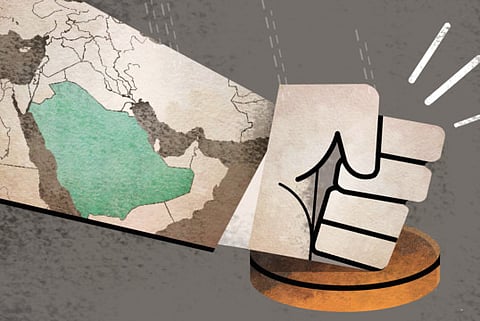A bold Saudi Arabia is good for the region
The younger and more assertive team in Riyadh is probably the best thing that has happened in a long time

No one expected that the usually discrete Saudi Arabia would start 2016 with the mass execution of 47 people convicted of acts of terrorism and calling for the overthrow of the government. But the new leadership in Saudi Arabia did.
This was the largest mass execution of its kind in the kingdom since the 1980s. Also, nobody expected the typically cautious Saudi Arabia to go through with the execution of the radical Shiite preacher Nimr Al Nimr. Everyone thought the fiery preacher was untouchable. But Riyadh was determined and went through with the unexpected execution. The executions — 43 were beheaded and four executed by firing squad — took everybody by surprise. Even keen observers of Saudi affairs did not see it coming.
In retrospect, it seems that everybody had underestimated how determined the new king is and how tough the younger team in Riyadh is.
Ever since the ascendance of 79-year-old King Salman Bin Abdul Aziz nearly a year ago, Saudi Arabia has taken everybody by surprise with an avalanche of bolder-than-usual decisions. It all started with the unprecedented handing over of the day-to-day power to a younger generation, driven by a new vision of Saudi Arabia for the 21st century.
This new vision was amply illustrated in a January 6 interview in the Economist with Saudi Arabia’s Deputy Crown Prince Mohammad Bin Salman, who’s also the country’s Minister of Defence, the man who wields the power behind the throne of his father King Salman.
New determination
The emergence of the younger leader was instantly followed by the March 2015 ‘decisive storm’ military operation in Yemen. The ten-month Yemen campaign signals the height of Riyadh’s new determination to stand up to Iran on its own ground.
Many thought the Yemen military operation would detract Riyadh from its focus on Syria. But Riyadh decided to raise the ante in the five-year-old Syrian war. It also hosted one of the largest meetings of Syria’s opposition groups and fighters as part of international efforts to unite the anti-regime coalition in preparation for the second round of talks to reach a possible political settlement.
Riyadh went against all odds and pulled through a highly successful meeting to unite the Syrian opposition.
But there was news of more tougher-than-usual decisions coming from Riyadh. Just last week, the new team announced massive spending cuts, unprecedented austerity programmes and wide-ranging economic reforms at home, including lucrative plans to privatise the $10 trillion (Dh36.78 trillion) Saudi Aramco. This is probably the biggest policy shake-up of the economy in recent Saudi history.
Time to be assertive
These are but a few examples of the eventful first year for the new king.
The key feature of the year is that Saudi Arabia seems to be self-confident, highly determined and indeed in a hawkish mood. Saudi Arabia is ready to confront domestic challenges and regional rivals with utmost resolve.
It is time to be assertive, especially with the two equally dangerous adversaries: Terrorism and Iran.
Saudi Arabia could not afford to act nice when the mobs in Tehran torched its embassy and rampaged through its consulates while the Iranian government looked on.
It would not stand by as Iran’s supreme leader denounced the ruling family and called for “divine revenge” on the Saudis.
Riyadh has decided not to allow Iran to posture itself as the protector of the Shiites of the Arab world, as it has been doing since 1979. It is not going to be business as usual with interventionist and expansionist Iran.
For the new team in Saudi Arabia, it is time to act tougher than expected with Iran and terrorism. The execution of the 47 agitators, including the firebrand Al Nimr, shows zero tolerance towards both terrorism and Iran regardless of the reactions.
What matters most is not Iran and the world’s reaction, but the domestic audience.
The bold Saudi government knew well in advance that the Saudi public urged decisiveness and was generally receptive to a tough approach to confront hardliners in Iran.
They have had enough of Iran’s bullying and genuinely feel that they are being targeted by Tehran as much as by Daesh (the self-proclaimed Islamic State of Iraq and the Levant).
No one can deliver tit-for-tat better to hardliners in Tehran than a hardliner team in Riyadh. Ultimately, the aim of the new Saudi assertive approach is to check Iran’s relentless interferences in Arab affairs.
In fact, the tough-talking Adel Al Jubair, Saudi Arabia’s Foreign Minister, has threatened that his country might take stronger measures against Iran.
Similarly, UAE Foreign Minister Shaikh Abdullah Bin Zayed Al Nahyan added that it is now up to Iran to decide what kind of neighbour it wants to be.
Riyadh’s tougher-than-usual posturing sends a message to the United States, the European Union, the West and the rest who view the post-nuclear-deal Iran as the new darling.
Riyadh is in no mood for such naivete. Up close, the Arab Gulf states see nothing but a certified radical and clerical Iran.
It is about time that the world gets used to a Saudi Arabia that talks and walks tough. A bold Saudi Arabia is a good Saudi Arabia. Indeed, the younger, more assertive team in Riyadh is probably the best thing that has happened to Saudi Arabia in a long time. It may even prove to be good for regional and even global order and stability.
Dr Abdulkhaleq Abdulla is professor of Political Science and chairman of the Arab Council for Social Sciences, theacss.org. You can follow him on Twitter at twitter.com/Abdulkhaleq_UAE.
Sign up for the Daily Briefing
Get the latest news and updates straight to your inbox



